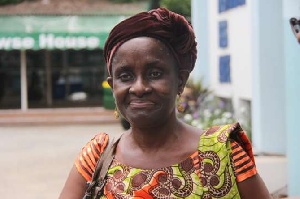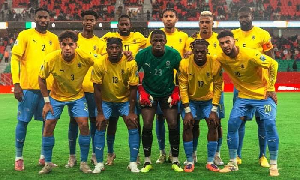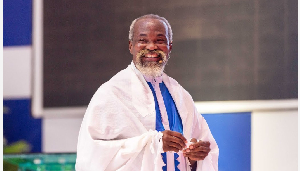From time to time, one hears lamentations, or criticisms, about the adulteration of Ghanaian culture, that foreign ways and even food, are replacing ours; that our traditions are being displaced by foreign practices.
Culture is generally defined as the beliefs, way of life, art and customs that are shared and accepted by people in a particular society, passed down from generation to generation.
Yet, there’s one serious example of cultural degradation that threatens our heritage, but which nobody is talking about, at least not openly. It is the absorbing by the church of the traditional ceremony to welcome newborns commonly referred to as ‘outdooring’, which includes naming the baby.
‘Outdooring’ ideally takes place in a family home, a week or eight days after the birth, and the climax of the ceremony is the symbolic teaching of the importance of honesty. This is done by giving the baby a taste of two different liquids, alcohol (Schnapps) and water, to demonstrate the difference between them, for which reason one cannot be substituted for the other.
However, in recent times, this traditional custom has been taken over by the Christian religious community. The main rites have been modified and incorporated into a Christian ceremony that takes place in a church, concluded with baptism. Instead of Schnapps, a soft drink or honey is used.
Perhaps some may see this as ‘modernisation’, but is it needed? To me it’s another disturbing example of our cultural heritage being whittled away.
In times past, parents held their outdooring in their family home. With Christians, later a second ceremony would take place, the baptism in church – usually with a Christian name given the infant.
Now, sadly, more and more the practice is that of the combined ceremony. But why discard a very important, beautiful and meaningful cultural rite as the outdooring ceremony, arguably unique to Ghana?
This thorny, delicate issue has long been on my mind and recently, I decided to seek the views of some church leaders and other people.
The question I posed to them was mainly: Why is it that the traditional Ghanaian baby-naming or ‘outdooring’ has been taken over by the church?
These days, instead of parents having the customary ‘outdooring’/naming when the baby is a week (or a few weeks) old, and later having the baby baptized in church, both ceremonies are combined and done in church! And, of course, no traditional outdooring rites take place!
Yet, when it comes to marriage, the church insists that couples marry the customary way, go through the traditional rites, before they do the church wedding.
My thinking is that, similarly, to preserve Ghanaian culture, the church should advise couples to do the customary outdooring/naming (at home) and then baptise the baby in a church ceremony.
And it seems nobody is concerned that an important aspect of Ghanaian culture is dying out! The church has taken over the ‘outdooring’ – leaving out the customary rites!
Your thoughts on this, please.
RESPONSES: THE FOLLOWING, IN NO PARTICULAR ORDER, ARE SUMMARIES OF COMMENTS BY THE INTERVIEWEES:
Rev Superintendent Mrs Emelia Quist, Chaplain, The Ghana Police Church, Accra:
I agree with you, a hundred percent on your valid and legitimate concern. The Presbyterian Church of Ghana Liturgy has a separate Order of Service for the naming ceremony and Baptism.
I agree with you that the naming ceremony should take place in the home rather than in the chapel and it needs to be handled more as a family ceremony, like customary marriage; even though the customary or traditional marriage has some legal implications, whereas the naming doesn’t.
It is understandable that the baptism is a church matter, whereas the naming ceremony is purely for the family. However, I have realised that sometimes the family will prefer the naming ceremony to take place in the chapel because of lack of decent place in the family home.
I will consult with some senior Presbyterian Ministers and see what will come out of our discussions.
Rev Dr Joyce Aryee, Executive Director, Salt and Light Ministries:
We have, alas, become quite confused. As Christians most of us are not living by the precepts of Christ, nor do we even recognise that by our union with Him, we have been transformed and given power to lead righteous lives.
A lot of our church leaders are not raising congregants who want to live right to serve their generation. We are in trouble and need a radical revival.
Rev Prof J. Kwabena Asamoah-Gyadu, President, Trinity Theological Seminary, Legon:
This is an issue over which many have expressed concern. It comes from the unjustifiable demonisation of our culture, especially by exponents of healing and deliverance.
People have been made to believe that when family elders touch their babies, those infants could become demon infested. It is the reason why even during traditional marriages, pastors are invited to sit in to mitigate any such apparent demonic influence.
Nevertheless, the church cannot be blamed fully, because it is difficult to deny members the pastoral service requested for … Our faith practices have become so bizarre, I wonder where we are headed.
Mr I.K. Gyasi, retired Headmaster, T.I Ahmadiyya Senior High School, Kumasi:
I am an Ahmadi Muslim. I should say that to a very large extent, Christianity and Islam (especially Islam) have taken over our culture. It is not just our naming ceremony, but so many beliefs and practices. The sad thing is that we condemn our own beliefs and practices as ‘traditional’, ‘outmoded’, ‘heathenism’, ‘pagan’; and not as good as the ‘imported’ varieties.
Mr Justice Ofori-Elikem, Business Development Consultant, Accra, a “pragmatic Christian”:
I think the church community in Ghana is getting confused. We in Africa blindly copied the practices of the Western missionaries who came over to our continent in an attempt to brainwash us.
Most of these missionaries didn’t understand our cultural practices; therefore, everything African was demonized (including the use of medicinal herbs). So the church taking over the naming ceremonies is simply a blind imitation of the Western or Jewish practice. The only explanation I can think of is that the parents of the baby Jesus Christ took Him to the synagogue to be dedicated in line with their Jewish custom.
Currently in Ghana, it is erroneously believed that the parents of every newborn child must follow what was done when Jesus was born. This has now become the norm. If you call yourself a Christian and you make an attempt to follow the traditional naming ceremony, you are likely to be castigated or even ostracised.
Rev Dr Cyril G.K. Fayose, General Secretary, Christian Council of Ghana:
Thanks for the opportunity to comment on this awkward phenomenon.
You are absolutely right. It has become fashionable these days for many to combine outdooring with baptism into one service in church and it is neither helpful for the church nor the traditional society.
While baptismal rite is a reception of the newborn into the church family, the witnesses of these combined services are not entirely church families. Our customs and traditions are watered-down, or completely ignored in these combined services.
However, I do not think that this recent practice has the official endorsement of the church, at least, not the Christian Council of Ghana member churches.
I believe this practice has become popular for a number of reasons. Convenience and misconception are two reasons that come readily to mind. It is convenient for the family of the newborn and the church leaders to combine the two events into one and save on time and resources.
The second is the misconception that everything traditional is un-Christian and evil. There is nothing further from the truth. I believe traditional religion and cultural practices have a lot to teach modern religions like Christianity.
We should give unto Caesar what is Caesar's and to God what is God's. Outdoorings should continue to be held in homes; and baptisms in the church.
I believe education of church leaders by the church and advocacy on the part of traditional society is the way forward.
Question: Any possibility of the Christian Council having a role in this, please, the way forward?
Rev Dr Fayose: Yes, I will make a proposal to the Council.
CONCLUSION:
Beyond criticisms and lamentation, I see the need for everybody to play a part in this national ‘sankofa’ (meaning if you forget something and go back for it, it’s not a taboo) exercise.
The traditional ‘outdooring’ is one ceremony that differentiates Ghana from other societies and it’s also a ceremony much admired by foreigners.
True, culture should, and does transform, or is modified over time. But shouldn’t modification or even banning, apply only to cruel practices such as widowhood rites or labelling vulnerable old women as witches and murdering them?
Great significance is attached to all aspects of the traditional outdooring and naming, so why should it be adulterated? If cultural heritage is what is handed down from generation to generation, which outdooring version is the present generation handing down to the next?
But thankfully, all is not lost, because of the encouraging responses above, and the assurance from the Christian Council of Ghana. I believe that the awareness creation is taking off and, hopefully, will impact positively on society at large to help maintain the traditional ‘outdooring’ as a precious Ghanaian cultural heritage.
ajoayeboahafari@yahoo.com
……………………………………………………………………………………….
Ajoa Yeboah-Afari
BBC correspondent (‘Focus on Africa’ programme, 1984 – 1996); President of the Ghana Journalists Association (October, 2003 – May, 2006); first Public Affairs Officer, Commonwealth Secretariat, London, (January, 1997 – September, 2002).
Opinions of Thursday, 24 August 2023
Columnist: Ajoa Yeboah-Afari















